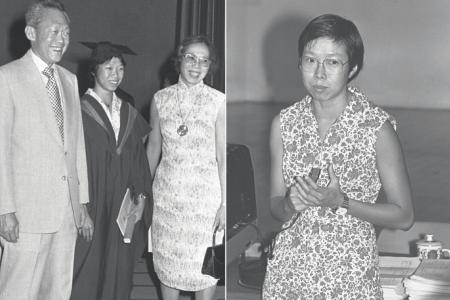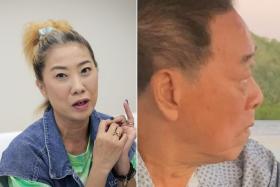Lee Wei Ling: Fearless fighter, friend of the underdog
Born on Jan 7, 1955 to Singapore’s founding Prime Minister Lee Kuan Yew and Madam Kwa Geok Choo, Dr Lee Wei Ling chose a role in life that she deemed relatively low-profile but which she said gave her satisfaction.
Just four when her father became the country’s first prime minister, she never went into politics, and instead decided to become a medical doctor – which she referred to as her calling.
During a career that spanned 40 years, her patients were her preoccupation, and their stories often appeared in her writings when she became an occasional columnist for this newspaper from 2006 to 2016.
The paediatric neurologist was known for her stoicism and reserved manner, but those who knew her found a person of great depth, intelligence and unwavering principles, said Dr Stephen Phua, a university classmate.
Dr Lee, who never married, continued to live with her parents in their Oxley Road home and cared for them in their old age.
In 2020, she was diagnosed with progressive supranuclear palsy, a rare, degenerative brain disorder that affects physical movements, eye movements and eventually swallowing, and can lead to serious complications such as pneumonia and choking.
Announcing her diagnosis in a Facebook post on Aug 8 that year, Dr Lee described it as a “rather nasty brain disease” that will result in death “for the fortunate”.
“It would be nice if this entire episode turns out to be a nightmare and that I will wake up. But it is getting increasingly real and inescapable every day,” she posted.
Dr Lee died peacefully at home at 38 Oxley Road on Oct 9, 2024. She was 69.
A brainy student
As a child, Dr Lee often accompanied her parents on official trips, and showed an insouciance that caught the eye of journalists.
She made the news when she ran up the Great Wall with nary a pause for breath during a visit to Beijing in 1976, and when she wore a samfoo to dinner with British prime minister Edward Heath at No.10 Downing Street in London in 1971.
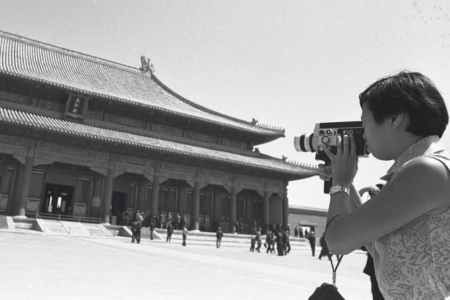
Her achievements were also chronicled in newspaper articles over the years, such as when she became one of the youngest Singaporeans to attain a black belt in karate in 1970, and graduated top of her class year after year, including at Raffles Institution, and became a President’s Scholar in 1973.
She once wrote about how she was rather disobedient in Primary 1, when she was far ahead of her classmates. At the end of that school year, she went directly into Primary 3.
“I went from being top student in Primary 1 to eighth in Primary 3. From then on, I worked extremely hard, and I have at times wondered in later life whether my tenacity was the result of this double promotion,” she wrote in a column for The Straits Times in 2011.
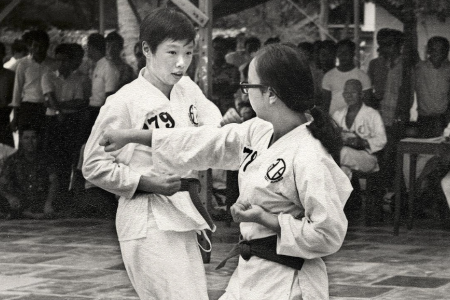
Though she did well in school, and was a self-professed consistent student, Dr Lee revealed she nevertheless had low self-confidence and fretted about doing poorly after every exam.
She also felt the need to be a role model for national policies when she was young.
“I had to be very effective at being bilingual because I had to prove that the bilingual policy was going to be a successful policy. I had to take a third language in addition.
“I had to try and do well academically. I had to be a cadet because that time was the days of the rugged society, remember? I had to be a model to other students,” she told the Today newspaper in a 2003 interview.
In the same interview, she also spoke of being the only member of her family who can walk down the streets without being recognised.

This was a privilege she treasured, but which she gave up when she decided to write columns for The Straits Times in the 2000s.
She often shared her opinions on issues ranging from her philosophy to life to medicine, never shying away from criticising the establishment when she did not agree with a particular policy.
Commenting on the scrutiny she received in a 2009 column, she said: “As long as my conscience is clear, what other people say of me does not bother me. Indeed, I am open about my life since the more I try to conceal from the public, the wilder the speculation becomes.”
A life in medicine
While her childhood wish was to be a veterinarian, she was dissuaded from this by her parents, and instead became a doctor.
After graduating at the top of her class with a Bachelor of Medicine and Bachelor of Surgery degree in the medical faculty of the University of Singapore, now the National University of Singapore, she went into paediatrics.
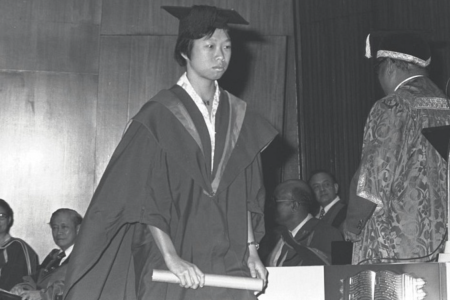
She started out in the paediatric ward at the Singapore General Hospital (SGH), and received board certification from the American Board of Clinical Neuropsychology.
She also became the director of the National Neuroscience Institute in 2004, a post she would hold for eleven years until 2014.
“I chose a role that is relatively low-profile, but which gives me satisfaction since I am able to help and comfort my patients,” she wrote in 2010.
“The psychological rewards of being a doctor are almost immediate versus the longer time frames for a public policy or business decision to bear fruit.”

She often went above and beyond her duty as a doctor, and once helped a “very special patient”, Jacqueline Woo, who had dystonia – a movement disorder characterised by involuntary and sustained muscle spasms. Jac, as Dr Lee fondly called her, was wheelchair-bound from the age of four, and could hardly talk then.
While Jac scored As in history, literature and Chinese in her GCE A-level examinations in 2011, Dr Lee admitted that it would be arduous for Jac to navigate a university campus and take part in class discussions.
After she wrote about Jac, the National University of Singapore, the Nanyang Technological University and the Singapore Management University all put out a welcome mat for the teen.
Contacted for a comment on the chain of events triggered by her column, Dr Lee had only one word to offer: “Compassion.”
Dr Lee said she chose to practise medicine in the public sector as she wanted to serve all patients, without having to consider whether they could pay her fees.
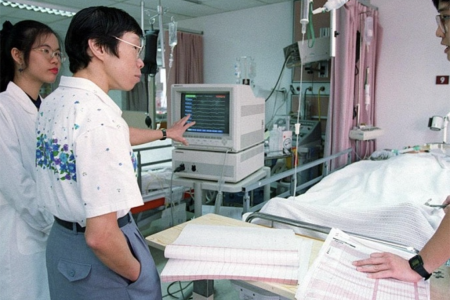
She believed that the biggest challenge facing medicine in Singapore was the struggle between two incentives that drive doctors in opposite directions – the humanitarian, ethical, compassionate drive to do the best by all patients, versus the cold, calculating attitude that seeks to profit from as many patients as possible.
“Hopefully, the first will triumph,” she said.
Asked if she had ever considered going into politics, she said: “I’m not made for this type of thing.”
Staying single
In her writings, Dr Lee said she was happily single, though she knew that her parents would have preferred that she married and had children.
“I knew I could not live my life around a husband; nor would I want a husband to live his life around me,” she said.
She saw to the daily care of her parents, especially after her mother suffered two strokes in 2008 and became mostly bed-bound.
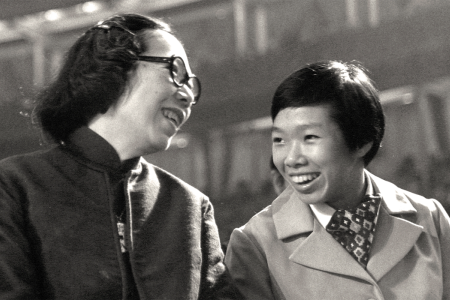
After Mrs Lee died in 2010, Dr Lee turned her attention to her father. She became his travelling companion and sounding board whenever he went overseas, and took care of him as he got older and more frail.
Her writings about her life also gave a glimpse into how her family lived.
Through her columns, Singaporeans learnt of the depth of love between her parents, and saw a softer, gentler side of the founding prime minister.
In a 2009 column in The Straits Times, Dr Lee wrote about how her father, the eldest son in a typical Peranakan family, could not even crack a soft-boiled egg.
“But when my mother’s health deteriorated, he readily adjusted his lifestyle to accommodate her, took care of her medications and lived his life around her,” she said.
In her eulogy to her father, she said: “I have no regrets, no regrets I was able to look after you and Mama in your old age.”
Family home and falling out
Dr Lee said she was, like her father, pugnacious by nature and enjoyed a fight if she felt it was for a just cause.
In a 2010 column, she recounted being mugged while in the US, and refusing to part with her money knowing it would likely go towards drugs.
“There is a Chinese saying: ‘I will not bow for five bushels of padi.’ Well, I will not bow or compromise my principles even if my life were at risk,” she wrote.
In the same vein, she had steadfastly clung on to her beliefs in the long-running family feud over 38 Oxley Road.
The pre-war home, bequeathed to SM Lee, has been at the centre of a family feud since Mr Lee Kuan Yew died in March 2015.
Dr Lee and Mr Lee Hsien Yang had alleged that SM Lee, then the prime minister, wanted the house preserved for his political gain, against their father’s wishes.
But SM Lee refuted their accusations in a ministerial statement in Parliament, after having raised “grave concerns” over the “troubling circumstances” around the preparation of their late father’s final will.
SM Lee sold the house to Mr Lee Hsien Yang in 2015 at market value, on the condition that they both donated half of the value to charity. SM Lee ended up donating 100 per cent of his proceeds.
Mr Lee Hsien Yang’s wife, lawyer Lee Suet Fern, was in 2020 found guilty of misconduct unbefitting an advocate and solicitor over her role in preparing the will.
Throughout the dispute, Dr Lee had taken to Facebook to air her views. Her last post about the matter was in 2020.
In 2018, a ministerial committee looking into what to do with the property had recommended three options for a future government to decide on.
They are: to preserve the property and gazette it for conservation or as a national monument; retain the basement dining room, which has the most historical significance, and tear down the rest of the property; or to allow the property to be demolished fully for redevelopment.
SM Lee said subsequently that he accepted the ministerial committee’s conclusions, but that there was no need to make an immediate decision as his sister continued to stay there. Dr Lee’s death means the house has become unoccupied.
Loyal, stoic to the last
An exercise enthusiast who for years spent hours each day running, throwing an exercise ball or bounding up and down stairs, Dr Lee’s ailment saw her lose the ability to walk, balance, and talk.
Yet, she appeared to have dealt with it with the stoicism she showed in her writings.
In a 2015 column, she wrote about her struggles to make peace with ageing and illness, having long believed that she could overcome the ravages of time through strict discipline.
“I have no choice but to adapt. I cannot even blame fate because we are all fated to grow old and less vigorous,” she wrote.
Emeritus Professor CN Lee, who has known Dr Lee since they were children, said they bade goodbye to each other when she realised she had an incurable condition and was still able to do so.
“She had a pure heart, and was loyal to her friends and patients,” said Prof Lee, a childhood friend and son of the late People’s Action Party stalwart Lee Khoon Choy.
Neurosurgeon Ivan Ng, who was mentored by her, told ST that Dr Lee had always been a leader.
“Thank you for teaching me loyalty, leadership by example, service without need for recognition; and for your invaluable friendship of a lifetime,” he said.
Ms Vivian Goh, who has spinal muscular atrophy since she was two, recounted how Dr Lee would collect and deliver National Day goody bags for her each year, knowing how much she cherished them.
“Her kindness was truly remarkable. She never let her status define her and remained relatable and selfless, always prioritising the needs of others.”
Get The New Paper on your phone with the free TNP app. Download from the Apple App Store or Google Play Store now

